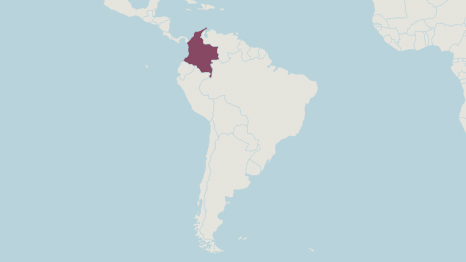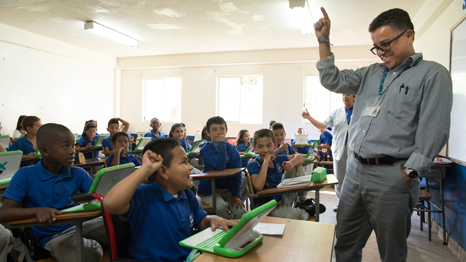STEM education in Colombia
“Collaborative experimentation is a new approach to teaching in Colombia. Group discussion and listening to others means everyone is included in a dialog, even if a child is the son of a paramilitary or a guerilla. That is what it means to teach the peace process,” says Nestor David Restrepo, education secretary of Departamento de Antioquia, about science and technology education’s impact on the reform process in Colombia.
Education in Colombia
Colombia is a country with deep rifts from civil war. But it is now searching for peace, and education has an important role to play in building bridges toward social cohesion. By 2025, Colombia wants to be among Latin America’s best when it comes to education, which is why the country is focusing on effective qualification and continuing education opportunities for teachers in addition to modern science and technology education classroom methods. STEM teaching and learning should not be conducted from the front of the classroom but should focus on a specific problem in an interactive and cooperative way. It should enable young people to make informed, considered decisions.

- Preschool (Educación inicial: 2 years), primary school (Educación básica: 5 years), secondary school (Educación primaria y secundaria: 4 years)
- Education budget: 4.5 % of GDP (2015)
- WEF Ranking Maths and Science: 100 of 137 (2017/18)
- PISA study 2015: 59 of 71
- Important topics: Increasing peace and stability; improving teacher education; establishing a national curriculum
Our engagement in STEM
With courage, creativity, and a strong will to change, stakeholders from education, academia, business, and politics are committed to improving the science and technology skills of young people. Siemens Stiftung international and the local Fundación Siemens Colombia are contributing to this goal with STEM education programs and related networking and committee work.
International educational program Experimento
In 2011, Fundación Siemens Colombia worked with education authorities in the city of Medellín and with Universidad de Los Andes to implement Siemens Stiftung’s education program, Experimento. In addition to Medellín and Departamento de Antioquia, primary school students in the cities of Bogota/Tenjo, Cali, and Barranquilla have been conducting Experimento experiments since 2015. The university adapted Experimento to the national curriculum and developed custom training methods for teachers. Teachers also have the opportunity to take part in a certified training program.
Medellín – Effective education on display
Experimento is implemented in Medellín along the entire education chain, from kindergarten to primary and secondary school all the way to university. This has been successful: School psychologists observe significant improvements in how students treat each other in Medellín’s “social problem areas.” Experience has shown that prejudice, violence, bullying, and aggressive behavior at school have been reduced through group work and inquiry-based learning.
STEM + H: Comprehensive education for the common good
In 2017, Medellín began expanding its educational engagement strategy even further by making the shift from STEM to STEM + H education (STEM + Humanity) and creating a link to the liberal arts. This reflects a desire for education that goes beyond developing science and technology skills and includes value-based lessons that contribute to a socially-oriented character, placing the common good at the center of a holistic education approach. Fundación Siemens Colombia and Siemens Stiftung provide hands-on support in this process by introducing Experimento and by remaining active in related networks. For example, the internationally-active TUM School of Education, a long-time partner of Siemens Stiftung, is directly involved in a local partnership with education authorities in addition to conducting teacher training in Medellín.
Working together and pooling resources
In addition to the hands-on work of Fundación Siemens Colombia and Siemens Stiftung, the two foundations serve as a link between community institutions, local businesses, local universities, and civil society representatives in establishing STEAM Territorios. These create an alliance for improving (STEM) educational quality with modern, publicly-available teaching and learning materials. This collaboration has turned Medellín into a city that stands for an ongoing policy of accessible, quality, and successful STEM education. “Territorio STEM + H” indicates a community-developed strategy applied in the interest of the common good.
Colombia in international collaborative alliance
The successful collaboration between active local stakeholders has been particularly effective in Colombia and has even extended beyond the country’s borders through additional work with education partners in Chile, Mexico, and Peru. An “Education Sister City” agreement from 2017 between Lima/Miraflores in Peru and Medellín has been an important part of the international success. The partnership is designed for discussing, developing, and implementing strategies and methods in support of (STEM) education.
Red STEM Latinoamérica
Since 2011, Siemens Stiftung has supported teachers and educators in eight Latin American countries with the foundation’s international education program Experimento, aiming to increase understanding in STEM subjects for children and young people and to awaken their interest in scientific and technological interrelationships. The Spanish website Red STEM Latinoamérica provides a comprehensive overview about the project and supports networking activities by individual stakeholders. Since 2020, you also find there a collection of about 500 open educational resources (OER) specifically designed for Latin American Schools.







